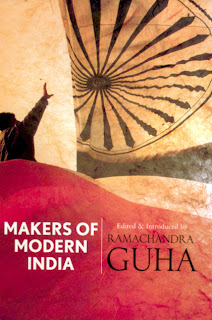As I read through the pages of Makers of Modern India, my ignorance strikes me hard on matters relating to Indian history, especially on the contributions of the great Indian writers who have, without a speck of doubt, changed the course of India towards the better. The first few pages of the book, as introduced by the erudite writer, Ramachandra Guha, enumerates, and discusses in short, the various writers he chose to bring forth to the reader, and the reasons for choosing those particular ones. The point that stands out for me, which Guha implicitly conveys, is that these were writers who wrote (or rewrote) the Indian condition as much as they wrote about it. Guha also goes on to say, that although India is a very unusual case in having had “so many politicians who were also original political thinkers,” it is not an entirely unique case, as demonstrated powerfully by the first generation of American nationalists - Madison, Hamilton, Jefferson and Franklin. There are some other names that must be mentioned, and I will have you hear to Guha’s own words.
“This was also true of Jose Marti of Cuba, Leopold Senghor of Senegal and Kwame Nkrumah of Ghana, who participated in movements to free their country from foreign rule while writing important works of propaganda and/or scholarship.”
Guha, in his introductory remarks, also claims India “to be the most interesting country in the world,” and calls it as “the impartial judgment of a historian, not the partisan claim of a citizen.” I have no wish to be accused of having such a remark be plucked out of context, for which reason I provide his elaboration on the given point.
“For one thing, India is very large and contains one-sixth of humankind. For another, its territory is astonishingly diverse, with its peoples differentiated by religion, language, caste and ethnicity, as well as by ecology, technology, dress and cuisine.”
I welcomed Guha’s remark, not because I partly shared it, but because I could now question it, and go over my entire train of thought. I do agree with him to a large extent, but I would be lying if I said India is the most interesting, simply because of my knowledge of various other regions in the world that have stunningly beautiful and breathtaking histories and cultures that flow down to produce the wonderfully complex, yet heart-warming and elegant societies. But even as I differ with him slightly, I most certainly agree with him on something that he draws attention to, which I wasn’t aware of, or at least not in the form that he gives it. He says,
“There were, and are, five revolutions simultaneously occurring in India: the urban revolution, the industrial revolution, the national revolution, the democratic revolution and the social revolution. The key word here is simultaneously.”
The makers of Modern India have lived through these revolutions writing about it, as they continually shaped and reshaped it. Their highly insightful yet laborious writings are with us, and form the backbone of the book.

No comments:
Post a Comment